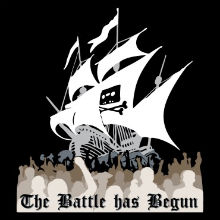Operation Payback has been without a doubt the longest and most widespread attack on anti-piracy groups, lawyers and lobbyists. Despite the massive media coverage, little is known about the key players who coordinate the operation and DDoS attacks. A relatively small group of people, they are seemingly fuelled by anger, frustration and a strong desire to have their voices heard.
 In the last two months, dozens of anti-piracy groups, copyright lawyers and pro-copyright outfits have been targeted by a group of Anonymous Internet ‘vigilantes’ under the flag of Operation Payback.
In the last two months, dozens of anti-piracy groups, copyright lawyers and pro-copyright outfits have been targeted by a group of Anonymous Internet ‘vigilantes’ under the flag of Operation Payback.
Initially DDoS assaults were started against the MPAA, RIAA and anti-piracy company AiPlex Software because these outfits had targeted The Pirate Bay. Those DDoS attacks were later replicated against many other targets that have spoken out against piracy or for copyright, resulting in widespread media coverage.
Even law enforcement agencies showed interest in the operation recently. Last week CNET reported that an FBI probe is underway, and TorrentFreak personally knows of at least one court case against a person that was associated with the operation.
Besides covering the results of the DDoS attacks and website hacks, very little is known about the people who are part of the operation. Who are they? What do they want, and what are their future plans? In this article we hope to solve a few pieces of the puzzle.
After numerous talks with people who are actively involved in Operation Payback, we learned that there are huge differences between the personal beliefs of members.
We can safely conclude that this Anonymous group doesn’t have a broad shared set of ideals. Instead, it is bound together by anger, frustration and the desire to be heard. Their actions are a direct response to the anti-piracy efforts of pro-copyright groups.
Aside from shared frustration, the people affiliated with the operation have something else in common. They are nearly all self-described geeks, avid file-sharers and many also have programming skills.
When Operation Payback started most players were not looking to participate in the copyright debate in a constructive way, they simply wanted to pay back the outfits that dared to target something they loved: file-sharing.
Many of the first participants who set the DDoS actions in motion either came from or were recruited on the message board 4Chan. But as the operation developed the 4Chan connection slowly disappeared. What’s left today are around a dozen members who are actively involved in planning the operation’s future, and several dozen more who help to execute the DDoS attacks.
An Anonymous spokesperson, from whose hand most of the manifestos originated, described the structure of the different groups to us.
“The core group is the #command channel on IRC. This core group does nothing more than being some sort of intermediary between the people in that IRC channel and the actual attack. Another group of people on IRC (the main channel called #operationpayback) are just there to fire on targets.”
Occasionally new people are invited to join the command to coordinate a specific attack, but a small group of people remains. The command group is also the place where new targets are picked, where future plans are discussed, and where manifestos are drafted. This self-appointed group makes most of the decisions, but often acts upon suggestions from bypassers in the main IRC channel.
Now let’s rewind a little and go back to the first attacks that started off the operation in September.
The operation’s command was ‘pleasantly’ surprised by the overwhelming media coverage and attention, but wondered where to go from there. They became the center of attention but really had no plan going forward. Eventually they decided to continue down the road that brought them there in the first place – more DDoS attacks.
What started as a retaliation against groups that wanted to take out The Pirate Bay slowly transformed into an attack against anyone involved in anti-piracy efforts. From trade groups, to lawyers, to dissenting artists. Since not all members were actively following the copyright debate, command often acted on suggestions from the public in the main IRC channel.
What followed was an avalanche of DDoS attacks that were picked up by several media outlets. This motivated the group to continue their strategy. Anonymous’ spokesperson admitted to TorrentFreak that the media attention was indeed part of what fuelled the operation to go forward. But not without some strategic mistakes.
...MORE HERE...















No comments:
Post a Comment